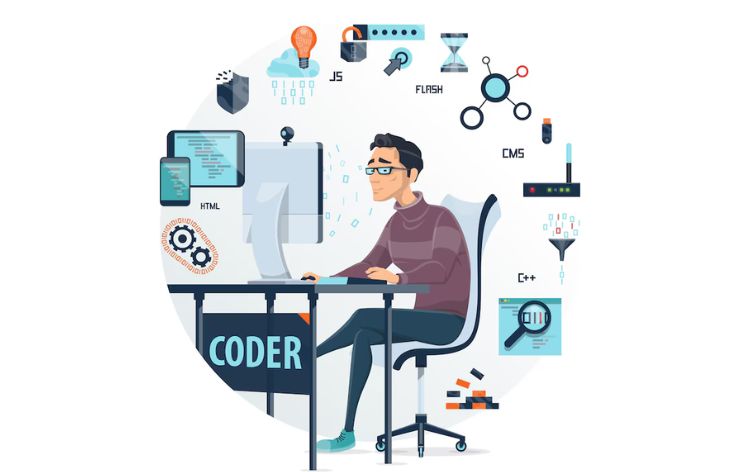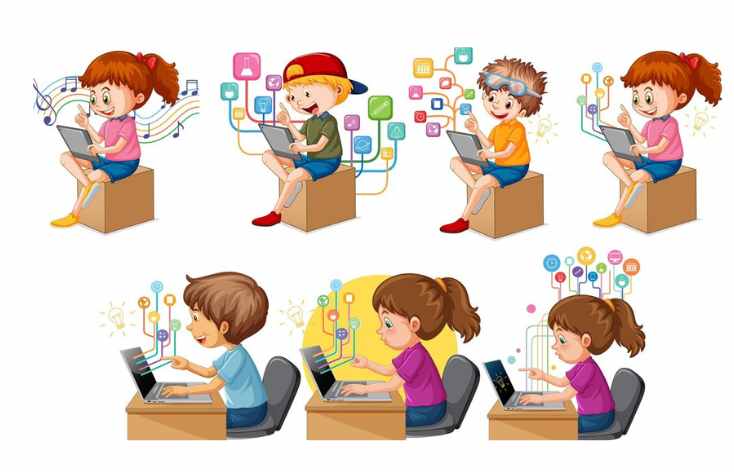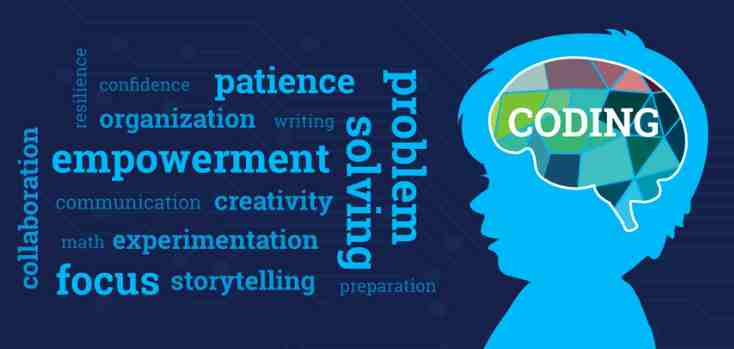Swipe Up
What is the Best Age for Kids to Start Learning Coding
Pinkey Sharma |
Coding |
2024-08-08 |
null mins read

Table of Contents
- How Children Can Understand Computer Coding
- What is Computer Coding in Schools?
- The Need for Coding System in Computer Education
- Determining the Best Age to Learn Coding
- Benefits of Coding for Kids
- Practical Steps to Introduce Coding to Kids
- Real-World Examples of Kids Excelling in Coding
- Enhances Problem-Solving Skills
- How Can Children Learn Coding?
- Conclusion
- FAQs related to best age for kids to Start Learning Coding
It is probably one of the greatest survival skills in this fast-moving, electronically developing age. On the other hand, the benefits it provides for children include giving them a proper base for any career opportunity, improving their problem-solving ability, sharpening critical thinking, and enhancing creativity. Though there is no specific age for learning, Coding for kids can be learned at any age from 5+ onwards.
How Children Can Understand Computer Coding
In other words, computer coding for children simply means teaching them how to write computer programs and, more importantly, understand the logic behind those programs. Actually, coding is the language through which human beings communicate and give instructions to the computer to do something. So, for kids to learn coding will be similar to learning a foreign language that many in the near future will find indispensable.
What is Computer Coding in Schools?
In the modern day and age, as technology is having a greater impact on living, the requirement for computer coding at schools is also gaining importance. The majority of schools do feel that it is necessary to have it as a part of the school curriculum. From very basic block-based coding websites like Scratch, young children are now being introduced to the process of programming. Advanced languages, such as Python, are also being used by some, though not that young.
The Need for Coding System in Computer Education
First and foremost, there is a need to understand the requirements of a coding system in computer education. Not only does coding enable the drawing up of software, but it also helps a child develop a systematic approach toward solving problems. Children will learn to break down complex problems into parts that they can manage and then solve them logically. The ability to do this can be applied to other areas like mathematics and science, but essentially in life situations.

Determining the Best Age to Learn Coding
How old should one be to learn to code? It is a question with many facets. Cognitive development, personal interests, and exposure are some of the many interacting factors that help define the right time for a child to take up coding.
-
Early Exposure (5-7 years)
Introduce concepts of coding at a young age—typically between 5 and 7 years old. At that age, kids are curious about everything and happen to easily pick up new languages. Tools like Scratch Jr and other simple robotics kits make coding fun for little minds. The code is represented through visual blocks, so it's easy for children to grasp central programming ideas without being worried by syntax.
-
Middle Childhood: Ages 8-11
This age is being considered as an ideal age to learn coding. Kids by this age have developed better reading and comprehension skills, and are able to accept more challenging tasks. Leaders such as Scratch, Code.org, and Tynker provided seamless transitions from block-based coding into text-based coding, which helps children make progress at their own speed depending on their capacity.
-
Pre-Teens and Teenagers: 12+
By the age of 12, children could be introduced to higher order programming languages like Python, Java Script, or Java. By this age, the young minds are more efficient at abstract thinking and taking up complex problems. Moreover, most teenagers start taking an interest in creating their personal games, websites, or apps by this age, which gives them a very practical incentive to study coding.

Benefits of Coding for Kids
Children can be introduced to coding at an early age of 5+ years. By learning coding children’s problem solving skills get improved. Children can develop strong problem-solving skills that turn out very useful in many areas of life.
This is a very creative activity in which children can bring ideas to life. This child shall one day design games, create websites, or develop applications—all giving life to thoughts of children and empowering innovation amongst them. That makes them think outside the box.
-
Improves Academic Performance
It can also positively affect a child's academic performance. Ways of logical thinking and solving problems, developed through coding, will help them perform better in mathematics and science. Also, most coding projects demand planning, sustainability, and attention to detail—very useful skills in absolutely all branches of knowledge.
-
Preparation for future career opportunities:
There are enormous career opportunities being available which children can perceive when they grow up in the field of Information technology. Thus the children should begin learning coding at an early age so that they become ready to accept the challenges to be faced in the future. The future can certainly be very bright if the children learn coding.
Practical Steps to Introduce Coding to Kids
If you are convinced about the goodness of coding for kids and looking at how to begin, then here are some steps to get you started:
-
Choose the Right Tools
There are lots of platforms and tools to teach kids how to code. Scratch Jr and Scratch, the visual programming languages, are excellent for younger children. As they grow older, you can progress them to text-based languages such as Python or JavaScript.
-
Make It Fun
The key to successful learning is to make it fun. Engage them in games, puzzles, and interactive projects. Most coding platforms provide game-based learning that makes the process enjoyable and educational.
-
Encourage Creativity
Let them work on projects in a field of interest. It could be making up a simple game, developing a digital tale, or many other cool robot building projects. Let them use their imagination and apply their coding skills in the most innovative ways.
-
Provide Support and Resources
As children begin to learn, issues will be encountered. Be there to give support and resources through online tutorials, coding clubs, and community events. Connections can also be encouraged between peers working together.
Real-World Examples of Kids Excelling in Coding
Across the world, many young coders are really leveraging technologies to bring change to the globe. Sure enough, age is just a number. Here are inspiring examples:
-
Samaira Mehta
Eight-year-old coder Samaira Mehta invented a board game, "Coder Bunnyz," to teach kids coding concepts. Her game was used in more than 100 schools in the United States, and she has been recognized by major tech companies like Google.
-
Tanmay Bakshi
started programming when he was 5, and at 9 he developed his first iOS application. Now well into his teens, Tanmay is an AI wunderkind who has been asked to give numerous talks, including at TEDx and IBM Developer Connect.
-
Emma Yang
At 14, Emma Yang designed an application, "Timeless", which makes use of face recognition techniques to help Alzheimer's patients recognize their loved ones. She began coding at the age of 6 and has used her skills to actually make a difference in the world.
Using today's technology, coding skills are more crucial for kids than ever. Here are the main benefits of this skill:
Enhances Problem-Solving Skills
It teaches them how to break down big, complex problems into small, workable parts. They gain a methodical approach to problem-solving, hence improving their analytical thinking in many other aspects of life.
-
Enhances Creativity
While learning, the children get to transform ideas into something concrete—either designing a game, an animation, or even making an app. This enhances creativity and gives a realization boost to innovative thinking.
-
Improves Academic Performance
The logical thinking and problem-solving skills developed through coding also enhance a child's performance in subjects like mathematics and science. Most coding projects require planning, perseverance, and attention to detail—very valuable academic skills.
-
Prepares for Future Careers
The advantage of coding skills is that, due to the high demand for tech professionals, they can give children a competitive edge in the job market. Early starting can bring a wide range of future career opportunities into view in varied fields.
-
Improves Collaboration and Communication
Since most of the coding tasks involve developing projects in teams, it will help children collaborate and communicate with others. They learn to share ideas, give feedback, and take them from others for the completion of common goals.
-
Develops Resilience and Tenacity:
Coding is an activity that may need one to try several times to perfect something. Therefore, children develop resilience and tenacity since they can press on even in the face of difficulties and go on to find solutions.
-
Latest Update on FEEDBACK Encourages Logical Thinking:
In essence, coding is writing a sequence of instructions that a computer executes. Hence, it trains logical thinking towards activities concerning everyday problems and decision-making, and cultivates attention to detail.
To put it simply, coding is not just a technical skill but also a powerful instrument of personal and academic development. In learning to code, children shall be able to develop the most basic competencies that will help them throughout their lives.

How Can Children Learn Coding?
Introducing children to coding does not have to be tedious. The process can actually be fun and engaging for the young minds. Here are ways on how your children can start to code:
-
Make them learn visual programming:
Scratch and ScratchJr are two awesome visual programming languages, the first being especially for kids. Drag-and-drop blocks provide a very easy and engaging pathway to introduce younger learners to coding concepts.
-
Online Courses:
Platforms like Code.org, Khan Academy, and Tynker have a number of online courses on teaching coding for kids. Their interactive lessons and projects make learning to code quite approachable and fun.
-
Make Use of Educational Apps
Apps like Lightbot, Kodable, and Hopscotch use games and puzzles to teach coding. In theory, these apps make coding fun and interactive, holding kids' interest while they learn.
-
Join Coding Clubs and Camps
Local coding clubs, after-school programs, and summer camps provide kids with a collaborative environment to study coding. Organizations like Girls Who Code and Coder Dojo run such programs and reach much more youth by touting teamwork and hands-on learning.
-
Try Robotics Kits
Robotics kits, such as LEGO Mind storms, Sphero, and Ozobot, join coding with physical construction. The idea behind these kits is letting the child get to grips with how their coding exercise comes into reality in the physical world, thus making learning more concrete and exciting.
-
Introduce Text-Based Coding
When your child feels comfortable in visual programming, gradually introduce text-based languages like Python or JavaScript. Codecademy and Blockly provide friendly lessons in these languages.
-
Encourage Project-Based Learning
Allow children to work on individual coding projects where they can easily make something like a game, a website, or an app. Project-based learning strengthens concepts of coding and enables children to express their newly acquired abilities creatively.
-
Provide Books and Other Resources
Books like "Hello Ruby" and "Python for Kids" offer both fun and educational content specifically for young children who want to learn how to code. Providing children with access to these resources may help further support and improve their learning journey.
These are some of the ways you can throw open this fantastic adventure in coding for the kids and equip them with basics beneficial for their future.
Conclusion
Indeed, there isn't exactly a "best age" to teach children this material; however, it is appropriate to begin when each child becomes interested, considering their cognitive development and early exposure to technology. Again, very early exposure can be very helpful, but middle childhood years and the teenage time are both excellent times to engage in coding.
Regardless of when children start, the benefits of coding are enormous: enhancing problem-solving skills and creativity, boosting academic performance, and laying the base for future careers. With the right tools, parents and educators can make the learning process easy and fun, while guidance will help children unlock their potential into the exciting world of coding.
It's not all about raising a techno-generation; letting your kid learn how to code means that he will be instilled with some of the most rated life skills. Be it 5 or 15, now is the time to get your child coding.
FAQs related to best age for kids to Start Learning Coding
What could be the best age to introduce kids to coding?
Kids can ideally start coding at 7 or 8 years of age. By then, they would have typically grasped the basics of reading and comprehension. However, for younger kids, coding principles can easily be introduced in quite a funny and enjoyable way.
What age is best to start Scratch coding?
MIT Media Lab experts designed Scratch to be used by children ages 8-16. Scratch provides a number of fun getting started ideas on its website.
Can a 3-year-old learn how to code?
Even though a 3-year-old child cannot, in the classical sense, code, it is true that they can start taking their first steps into logic and problem-solving through play. with age-appropriate games and applications that have been designed to introduce young children to the very simple concepts of coding.
At what age do most coders start?
While some begin earlier or later, most programmers start learning at the age of 10-12 years. The age changes depending on exposure, resources available, and areas of interest.
How old should one's child be to learn how to code?
Well, the time a child gets curious and excited about technology themselves is usually between 7-12 years of age, and that's when he/she should consider learning to code. However, it's never too late nor too early to learn; at this age, there will definitely be fun exercises and materials teaching kids the basics.
Is there any online video to explain the benefits of Teaching Kids to Code?
There are many online videos explaining why it's important to teach kids how to code. So, for instance, insightful videos are shared on YouTube or some educational websites like Khan Academy and Code.org, elaborating on how coding enhances problem-solving skills, creativity, and children's future job opportunities. You can also refer to Mitch Resnick of MIT Media Lab's TEDx video on Let's Teach Kids to Code
Related blogs:
Importance of Coding: Learn the importance of coding in the digital world with us.
Python Programming for Kids: Discover Python programming for kids with our playful guide.
Coding Impacts a Child's Problem-Solving Skills: Explore how coding boosts mental abilities and other skills in children.
Comments(0)
Admissions Open for 2025-26
Categories
Academics
Arts
Astronomy
Badminton
Basketball
CBSE Board
Chess
Child Learning
Children's Literature
Civics
Coding
Creativity
Cricket
Cycling
Dance
Days and Festival
English
Entertainment
Environmental Awareness
Famous Personalities
Featured Blogs
Football
Full Form
Geography
Health and Nutrition
Hindi
Hockey
Horticulture
Maths
Music
Parents Corner
Public Speaking
QnA
Recommended
Robotics
Science
Scientist and Their Inventions
Social Skills
Sports
Swimming
Taekwondo
Teacher's Corner
Theatre
Recent Blogs
Long-Term Impact of Learning Coding
Understanding Coding Competitions and Clubs
What Are the Popular Coding Platforms for Kids?
What is Python?
What is Scratch Programming?
What are programming languages?
Basic Concepts in Coding for Kids
Dealing with Coding Challenges and Debugging
What is the Importance of Coding?
What Are the Best Coding Platforms for Kids?
CBSE Schools In Popular Cities
CBSE Schools in Bangalore
CBSE Schools in Mumbai
CBSE Schools in Pune
CBSE Schools in Hyderabad
CBSE Schools in Chennai
CBSE Schools in Gurgaon
CBSE Schools in Kolkata
CBSE Schools in Indore
CBSE Schools in Sonipat
CBSE Schools in Delhi
CBSE Schools in Rohtak
CBSE Schools in Bhopal
CBSE Schools in Aurangabad
CBSE Schools in Jabalpur
CBSE Schools in Jaipur
CBSE Schools in Jodhpur
CBSE Schools in Nagpur
CBSE Schools in Ahmednagar
CBSE School In Tumkur


Speak Your Mind
Save my name, email and website in this browser for next time I comment